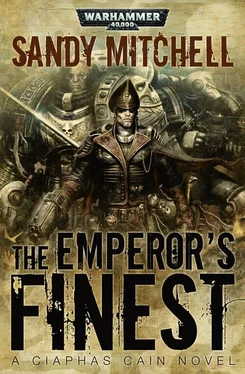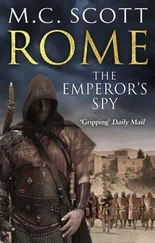'I suppose not,' I agreed, pouring myself a much-needed measure of amasec. In actual fact I was planning to do as much file-shuffling as possible, in preference to visiting any of the battlefronts, but I wasn't about to admit that to one of the Emperor's finest.
As things were to turn out, though, the insurrection had continued to grow while we'd been transiting the warp, and by the time we arrived, notions like fronts and rear areas had ceased to have any military meaning at all. The entire system was one huge cauldron, seething with conflict, and we were about to drop into the middle of it.
'Have you found time to analyse the strategic review?' Drumon asked, and I nodded towards the data-slate on the desk beside me.
'I've skimmed it,' I admitted, which was the best anyone could have hoped for, and a great deal better than I normally managed with the briefing documents provided by the Munitorum. Usually, I found far more pleasant ways of spending my time aboard ship than wading through the turgid prose of Administratum drones, whose conclusions would invariably turn out to have been overtaken by events while we were transiting the warp in any case, but the Revenant was conspicuously lacking in recreational opportunities. 'Pacifying Viridia looks simple enough.'
At the time my confidence seemed more than justified. Rebellions in backwater systems like this one tended to be sparked by grievances against the planetary government rather than the Imperium itself, and the arrival of a few Guard regiments was usually enough to bring both sides to heel. So far as I could see the situation hardly merited the deployment of the Astartes at all, and the Reclaimers would undoubtedly have found better uses for their time if it hadn't been for the fact that the Viridia System was a major supplier of food and raw materials to the hive-worlds of the sector: unless the flow of tithes was restored in pretty short order they'd begin to suffer socially and economically in turn, leading to a wave of instability which, left unchecked, would drag down a dozen worlds within a decade. The manpower and resources required to deal with that would be incalculable.
'I concur,' Drumon said, with all the confidence I would have expected from one of the Emperor's chosen, and I must admit that I considered it more than justified. The average insurrectionist rabble wouldn't last five minutes against a couple of dozen Guardsmen, let alone the genetically enhanced Space Marines. He might have been about to say more, but the familiar disorientating sensation of a starship slipping through the barrier separating the material universe from the warp swept over me at that point, leaving both of us disinclined to further conversation.
'I don't suppose I'll ever get used to that,' I said, little knowing at the time how far and frequent my travels were to become in the ensuing years, to the point where I was able to shrug off the lingering nausea almost at once. On this occasion, however, I was more than grateful for the amasec I'd poured a few moments before, and drained the goblet in a couple of swallows.
I was just beginning to feel relatively normal again when the lights flickered, and a faint tremor ran through the deck plates beneath my feet. Memories of my experience aboard the Hand of Vengeance a few years before sent my heart racing, and I was already reaching for my weapons when, after listening to the comm-bead in his ear for a moment, Drumon told me what I'd already deduced for myself. 'We appear to be under attack,' he said.
Editorial Note:
Since, as usual, Cain only gives the most cursory background to the events he's describing, here seems as good a place as any to insert a more objective overview of the Viridia Campaign at the point he entered it.
From The Virus of Betrayal: The Cleansing of Viridia and its Aftermath by Lady Ottaline Melmoth, 958.M41.
IT'S UNDOUBTEDLY FAIR to say that the first few months of what was to become the Viridian Insurrection gave few clues as to the scope of the chaos and carnage to come. What had begun as a wave of popular protest against the mooted imposition of a two per cent tax on incense and votive candles by the Administratum erupted into violence in several provinces almost simultaneously. With hindsight, of course, we can see how carefully events were orchestrated, from the moment an agent of the conspiracy first slipped the controversial measure into the fiscal projections for the following year. Despite the protestations of the planetary governor that he'd never seen the proposal, and certainly wouldn't have approved it if he had, a large section of the population laid the blame for it squarely at his door, some even going so far as to begin calling him ''Alaric the Heretic'' (a nickname which the poor man remains saddled with even today, albeit now in jest).
How much of the Ecclesiarchy's predictable condemnation of the so-called ''tax on piety'' was spontaneous, and how much the result of infiltration of their ranks, we can only conjecture, but there's no denying the outrage with which the average Viridian in the thoroughfare reacted. We've always been proud to call ourselves an Emperor-fearing folk, and the prospect of being unable to afford to maintain the tiny shrines which grace even the humblest hovel, or to do so only at the expense of starvation and destitution, a choice many of our poorest citizens would undoubtedly have made, was all but intolerable to most of the proletariat.
In vain, Governor DuPanya pledged that he personally would make sure that the proposed legislation was never enacted. By the beginning of 928, the ''piety tax'' had become a rallying point for malcontents of all kinds, united only in their dislike of the planetary government. After the initial riots had been suppressed by the Guardians [6] A typically vague statement: there seem to have been around forty or fifty in total, far fewer than a full-strength company, but still more than sufficient to deal with the kind of civil insurrection sweeping the Viridia System.
, backed up by elements from the Planetary Defence Force in a few cases, the inevitable casualties among the civilian population became the focus of fresh resentment, and the wave of unrest intensified. With what seemed at the time to be astonishing rapidity, but which with hindsight is clearly the result of careful coordination by the shadowy enemy whose existence as yet no one even suspected, Viridia became all but ungovernable, and Governor DuPanya was left with no choice but to appeal to the Imperial Guard for help.
Help was not slow in coming, but the distance between stars is a vast one, and many agonising months were to pass before the vanguard of the relief force arrived in our system. To the joy and astonishment of all loyal Imperial citizens, the vessel was no Imperial Guard troopship, but a battle-barge of the Astartes, bearing not only the matchless warriors of the Space Marines, but Commissar Cain, the hero whose exploits against the orkish invaders of Perlia had inspired billions across the sector.
As fate was to have it, however, no sooner had the Revenant reentered the materium than it was treacherously attacked, the anarchy which had by then overwhelmed our home world having spread to engulf the void stations and mining habs scattered throughout the system.
HAVING NO BETTER plan in mind, I followed Drumon to the bridge. If necessary, I was prepared to argue that my position as liaison officer made it my business to remain abreast of any unexpected developments, although to be honest I just thought that would be the best place to find out what in the Throne's name was going on. I've been involved in a fair number of space battles in my time, far more than any Guardsman has a right to expect, and in all too many of them the only thing I could do was sit there and wait for the troopship to take a hit. At least on the bridge you can watch events unfolding in the hololith, which introduces a curious kind of detachment into the proceedings, as the contact icons go through their stately dance of life and death.
Читать дальше












